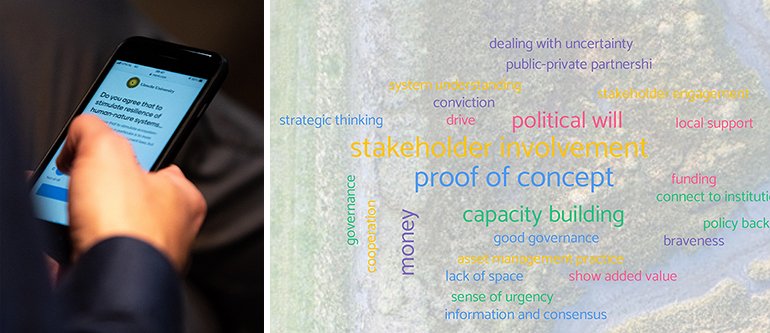Enabling upscaling of Ecosystem-Based Adaptation
Time to take action
Ecosystem-based Adaptation has increasingly attracted attention as sustainable solution in the long term to adapt and enhance the resilience of coastal systems. The ‘Enabling Ecosystem-based Adaptation for Climate Adaptation’ workshop focused on drivers from the perspectives of biophysical, governance and legal dimensions to enable upscaling Ecosystem-based Adaptation.
Interdisciplinary perspectives
An interdisciplinary group of academia, practitioners and policy makers joined us at the Social Impact Factory in Utrecht and on Zoom during this hybrid workshop on 13 October 2021. Already early in the workshop it became clear that the participants agreed on the potential of Ecosystem-based Adaptation as a sustainable solution to tackle climate change and societal issues.

One minute left...
We started the workshop with presentations on the drivers of global coastal change in the "Setting the Scene" session. Next, we had two in-depth sessions on two specific environments: (1) estuaries and muddy coasts and (2) sandy coasts with cases of research and practical projects in the Netherlands and internationally (Suriname, Indonesia, Vietnam, India). With a seven-minute pitch, the speakers shared their experiences from research and practice and their vision on what are the most important knowledge gaps for upscaling Ecosystem-based Adaptation and the first steps that need be taken to further enable its implementation.

We have to act now
During the panel discussion and at the end of the workshop, we asked the panel members and participants about the next steps to take to make Ecosystem-based Adaptation a success. Communication and education to raise public awareness and acceptance, thinking in opportunities rather than barriers, a strong and coherent story, setting clear goals and increase engagement with locals were mentioned as key points. Additionally, many notes emphasized the necessities to take actions immediately while we should create an enabling environment to implement measures, be transparent and not postpone actions to wait for major law reforms. It was also highlighted that an integrated approach that connects insights from all relevant disciplines (including governance and laws) is needed in early stage of formulation and planning of projects to ensure the feasibility of implementation of the ecosystem-based adaptation measures.
Connect to insights from other disciplines
At the end of the workshop, everyone was inspired by the experiences of others, gained new perspectives on from other disciplines and was motivated to take action. It was an inspiring workshop and we were very happy to meet each other in person again!

Programme
You can download the programme by clicking on the link below:
Presentations
You can download the presentations by clicking on the link:
- Enabling Ecosystem-based Adaptation for Climate Adaptation - Opening (Water, Climate & Future Deltas Hub; Utrecht University)
- Projections for future delta land loss. Potential ecosystem based adaptation? (Jaap Nienhuis; Utrecht University)
- Drivers of Coastal Change. Workshop Enabling Ecosystem-based adaptation (Arjen Luijendijk, Deltares)
- Growth and erosion dynamics of mangroves in Suriname and Indonesia (Steven de Jong; Utrecht University)
- Governing coastal ecosystem based adaptation: insights from Indonesia, India and Vietnam (Annisa Triyanti; Utrecht University)
- A recipe with legal ingredients for Ecosystem based Adaptation projects for Climate Adaptation. Innovative double dike projects in estuaries and along mud coasts Double dike pilot in Groningen as case study (Willemijn van Doorn Hoekveld & Marleen van Rijswick; Utrecht University)
- Double Dikes – Triple Benefits (Bas Roels; World Wide Fund for Nature)
- Ecological recovery and improved safety of coastal dunes (Gerben Ruessink; Utrecht University)
- Stabilising tropical beaches with seagrass (Rebecca James; Wageningen University & Research)
- Enabling Ecosystembased adaptation. Cross-sectoral and interdisciplinary cooperation is vital (Henk Nieboer; EcoShape)
The workshop was a joint effort of the Water, Climate and Future Deltas hub of Utrecht University and the Royal Netherlands Institute for Sea Research.
